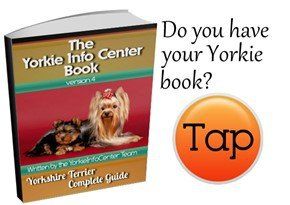Eating Grass
When a Yorkshire Terrier Has the Habit of Eating Grass
Overview
Does taking your little guy or gal into your yard, park, and other outdoor areas inevitably mean that your Yorkie will try to start munching on grass, even if they just ate a meal or treat? You may have heard that this is a common canine behavior and there are a lot of myths and conjecture about why dogs do this. This article will sort through the reasons Yorkies actually display this behavior and, importantly, exactly how to get your puppy or dog to stop.
The Negative Consequences of Eating Grass
Though some may compare grass to a salad, there are actually several reasons why it’s unhealthy or dangerous for a Yorkshire Terrier to ingest grass.
Let’s look at some concerns:
1. Digestive distress
– Grass is very difficult for dogs to ingest due to its high level of cellulose fiber. This doesn’t apply to animals that graze on grass like cattle that have completely different stomachs with four chambers or horses that have special microbes that can break grass down. For Yorkies that eat grass, those blades can cause quite a bit of discomfort, bloating, partial blockage, and other issues as they pass through the intestines.
2. Vomiting
– Roughly 25% of canines will vomit during or right after grass consumption which can lead to dehydration as well as throwing off a dog’s appetite for real food. Since Yorkshire Terriers are typically very small, another concern is hypoglycemia due to vomiting, which itself can cause vomiting thus creating a vicious circle.
3. Ingestion of toxic chemicals – Weed killer, fertilizer, and/or pesticides may be found on grass, with many of these substances being poisonous if ingested. Keep in mind that your own yard may contain chemical run-off from neighboring yards. And, in public areas, like parks, warning signs of grass treatments may be removed after a few weeks even though chemicals can linger for months.
4. Ingestion of toxic plants, weeds, flowers, or other vegetation – There are over 700 outdoor plants that are toxic to canines, not to mention poisonous mushrooms.
5. Tooth decay
– Toy breeds like the Yorkshire Terrier are already vulnerable to tooth decay. This is why at-home dental care
is such an important care element. While you are working to keep your little guy or gal’s teeth healthy, if your Yorkie is eating grass this is working against you. Grass contains silica, which is a very abrasive compound known to wear away at tooth enamel thus leading to faster decay and possible tooth loss.
6. Insects and other small creatures
– If your Yorkie has their head down in the grass, there are many dangers including toads like the Colorado River Toad and the Marine Toad; just mouthing these these cause seizures and difficulty breathing and can be fatal without treatment. Other concerns including bees and wasps like the ground digger wasp that stays close to the grass, as well as red ants and other stinging insects.
7. Interference with nutritional intake
– If a Yorkie eats grass and it stays down, there are very little nutrients that would actually be absorbed from it since canines cannot digest it. Though, it will fill the stomach, making a dog feel full and thereby interfering with their regular appetite for meals and healthy snacks.
Cuteness break!
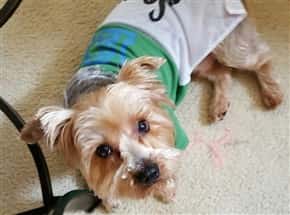
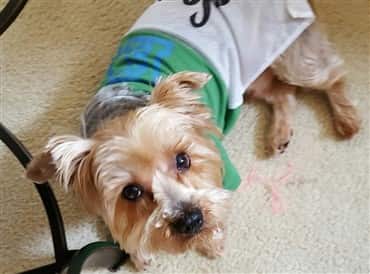
Brooklyn, at 4 years old, photo courtesy of Geovanna Brown
Less common, but possible are:
• Any certain protein. Though rare, canines can be allergic to chicken, turkey, beef, lamb, rabbit, bison, duck, or fish.
• Eggs
• Dairy (though technically this is an intolerance, because canines have trouble digesting milk products)
What to do:
1. First, note that when a dog is suffering from a food allergy, and a switch is made, it can take 8 to 12 weeks to see significant improvement.
So, choose wisely, do not veer off course, and be patient for those 2 to 3 months. As your Yorkie is making his way to be free of the allergens, you can also be treating symptoms (and we'll cover that ahead in Step 2).
2. If food allergies have caused your Yorkie to have vomiting and/or diarrhea,
it can help to withhold food for 12 hours (making sure that your dog stays hydrated), then place your puppy or dog on a bland diet of just 1 protein and 1 starch for 3 days before changing to a new, regular diet.
The most gentle proteins are lean beef or white skinless chicken. Good choices for the starch include plain white rice or sweet potato.
Why Yorkies Eat Grass
The question concerning why dogs eat grass has long been in debate. Several recent studies have shot down what used to be the one of the most common explanations: that dogs eat grass to purposely induce vomiting. But, we now know that this is not the case. Only about 1/4 of dogs actually throw up due to grass irritating the stomach.
So, why do some Yorkshire Terriers gobble up grass? It is due to one or more of the following reasons:
1. Hunger with or without nutritional deficiency.
Dogs often mouth (without swallowing) all kinds of things (a strong reason to always puppy-proof the house no matter your Yorkie’s age) but when they routinely ingest something like grass, this is indicative of hunger. The drive behind that hunger may be linked to a nutritional deficiency which itself can be due to a subpar diet but can, in some cases, be due to a health issue.
Let’s break this down a bit:
1A: Hunger linked to a subpar diet
– How much food you give to your Yorkie is only part of the equation here. This is because what keeps a dog full and satisfied until the next meal is the amount and type of nutrients from that food that is absorbed by the body.
When a dog is eating the recommended amount of food (typically based on weight and can be found under the ‘recommended feeding guidelines’ on packaging; keeping in mind that it considers several snacks
are being given), but is still looking for other food sources, like grass, this is most often due to that food containing fillers.
Fillers are inexpensive ingredients with little to no nutritional value meant to add bulk.
Dog food manufacturers add these cheap ‘foods’ to kibble as a cost-saving mechanism. Examples of fillers include corn (also seen as corn bran, corn gluten, corn cellulose, or corn starch), cereal by-products, soy, hulls (cottonseed, soybean, peanut, rice, etc.), and certain wheats or wheat by-products (including wheat mill run and grain fermentation soluble).
Some of those fillers, like corn, can’t even be digested and also have a high glycemic index that can raise blood sugar levels and in turn affect metabolism.
In essence, while it will appear that your Yorkie is eating, for example, a half cup of food, your little one may only be receiving nutrients from one-forth cup.
Another aspect is that even without the presence of fillers, kibble may be lacking essential nutrients. Canines require a balance of protein, carbohydrates, and healthy fats, as well as a wide-range of vitamins and minerals including vitamins A, B1, B2, B3, B6, B12, C, D, E, K, beta-carotene, biotin, calcium, folic acid, phosphorous, magnesium, and omegas (3, 6, and 9). If a kibble is lacking this, a dog may look elsewhere to meet their needs.
1B: Hunger linked to underlying health issues
– There are several health issues that can cause increased hunger with or without intestinal malabsorption. The top 6 are canine diabetes, inflammatory bowel disease (IBD), hyperthyroidism, Cushing’s disease, gastrointestinal cancers, and exocrine pancreatic insufficiency (EPI).
In addition, internal parasitic worms can cause malnutrion and/or increased hunger. Tapeworms are the most common culprit for this, though this may also be seen to a lesser degree with hookworms and whipworms.
Cuteness break!
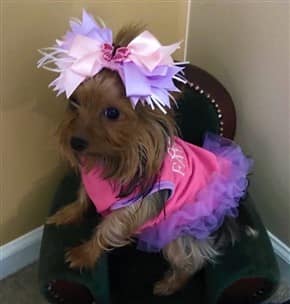
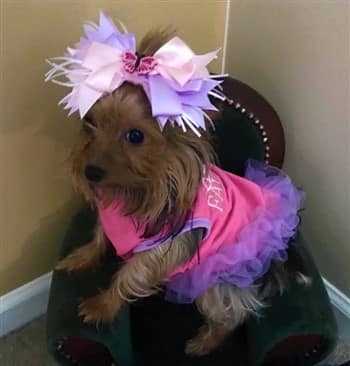
Lola, at 4 years old, photo courtesy of Brenda Pantoja
2. Compulsive habit.
What causes a dog to take their first mouthful of grass can vary. For some, it is simple curiosity. But, no matter what set-off that initial tasting, a Yorkie may find the act of chewing on grass to be soothing or serve as a time-filler.
This reason for eating grass often applies to Yorkshire Terriers that are left unsupervised when outside, or, if owners are present, they are distracted and not paying attention.
3. Attention-seeking behavior.
Repeated episodes of chewing on grass may have shown a Yorkie that it results in their owner running over, acting animated, being overly verbal, etc. And, for dogs that are craving attention, this may be their way of reaching their goal.
How to Get Your Yorkie to Stop Eating Grass
Now that you have a better understanding of the consequence of grass ingestion and what may be causing your Yorkie to eat grass, it’s time to cover as many bases as applicable to put a stop to the behavior.
1. Have health issues ruled out.
Even if your Yorkie’s only symptom is grass ingestion, it never hurts to have all possible health issues rule out during a wellness exam. As it is, adults should be receiving an annual exam and seniors should have checkups every 6 months.
This will include a check of vitals (temperature, pulse rate, respiratory rate) and weight. Testing will include a stool sample and a complete blood count (CBC) which will evaluate overall health and flag any infections as well as checking organ function, and electrolyte and protein levels. Senior dogs may have more advanced testing, including x-rays.
Cuteness break!

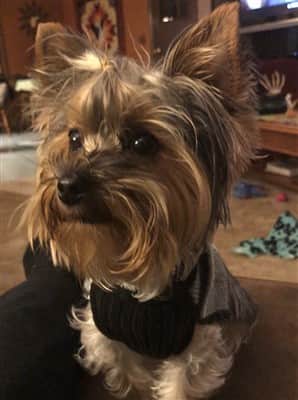
BeBe, at 10 months old, photo courtesy of Patti Mohling
2. Reassess your Yorkie’s diet.
Both your Yorkshire Terrier’s present and future health depends on their diet, so even if your Yorkie loves their food, it is of the utmost importance that you are sure that it is a high-quality brand.
Keep in mind that some of the most well-known brands (some of those that you see commercial for and many of those that are stacked up on grocery store and pet store shelves) can be low-quality kibbles. Sales are based solely on brand recognition and not quality.
If you are not sure of the rating of your Yorkie’s food, Dog Food Advisor
is a great site that will give you the break-down, as well as a rating between 1 and 5 stars.
And, if you are looking for recommendations, some of our top favorites are:
This is fantastic kibble that offers so much. The base is chicken and turkey. This also contains rice which most dogs find very tolerable (it is often prescribed when a dog is recovering from an upset stomach) because white rice is milled to remove the husk, bran layer, and germ, and brown rice is milled to remove the outer hull, which makes it easily digestible.
In addition, other beneficial ingredients include flaxseed, peas, spinach, sweet potatoes, blueberries, and apples. There are zero chemical preservatives; instead, this is preserved with a vitamin blend (mixed tocopherols). There are no by-products, soy, artificial flavoring or coloring.
And, it contains healthy levels of fiber, probiotics (for digestive health), and omega fatty acids. An added plus is that this is designed specifically for toy breeds, so that it is ideally sized.
If you are looking for a completely grain-free kibble, this is a great choice. This has all the goodness of the aforementioned ‘Complete’ formula (minus the rice).
Labeled for ‘small breeds’, this is designed for adult dogs as tiny as 2 lbs. (and there is a puppy formula as well).
What’s nice about this top-quality kibble is that it offers 4 great recipe choices, all designed for small dogs: Texas beef, lamb, chicken, and salmon. It has all the extras you want like probiotics and omegas and nothing you don’t want (like artificial preservatives, by-products, soy, corn, etc.).
3. Supervise in the yard.
This may seem a bit too obvious; however, dogs that tend to eat grass should not be left to their own devices outside in the yard.
And, if you feel that this won’t help since you have no control over your Yorkie’s habit of eating grass, know that you actually do; you just need to take charge!
An important part of this is to have your little one on a leash and harness like the Puppia Soft B Vest Harness , so that you can easily control your Yorkie’s actions without causing strain on the neck as could happen if using a collar.
, so that you can easily control your Yorkie’s actions without causing strain on the neck as could happen if using a collar.
Any time that your Yorkie makes an attempt to chew on grass while on leash, give a stern ‘No’, a quick tug on the leash, and then lead him a few steps away. Though it is you that interrupted the grass-eating attempt, offer praise for this. If the grass eating habit is very strong, additionally give treat rewards at random intervals.
For that extra motivation, be sure that the treat is something reserved only for reward, is small (as to not interfere with appetite), moist (which is better received than dry), and extra-tasty. Wellness WellBites Soft Natural Dog Treats
 is a great choice for this.
is a great choice for this.
If your Yorkie is off-leash in the yard and tries to eat grass, the goal is to interrupt and refocus. You can interrupt by clapping your hands or calling out your Yorkie’s name. If your Yorkie needs more than this to pay attention to you, try a behavioral device like the The Company of Animals Pet Corrector . This is a safe method used by professional trainers; it emits a short hissing noise that effectively causes a dog to pause their actions.
. This is a safe method used by professional trainers; it emits a short hissing noise that effectively causes a dog to pause their actions.
You can refocus by throwing a ball or fetch toy. Other stay-busy methods are coming up next.
Cuteness break!
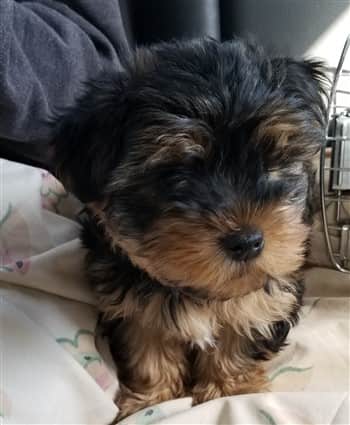
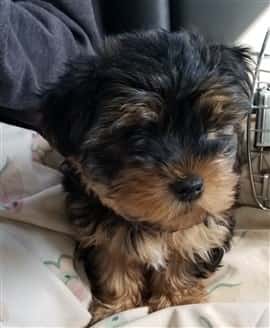
Zeke, at 3 months old, photo courtesy of Nicky Carter
4. Keep your Yorkie busy.
Maybe you want to spend some time outside reading on the patio or tending to your garden, and it would be nice if your Yorkie could join you… only, your little one’s grass eating habit makes it hard for this to happen.
The trick here to set up methods to keep your Yorkie occupied on other things.
If the weather is warm, setting up a sprinkler can be a great way to keep a dog entertained outside as is setting up a fun bubble blower like the Geekper Automatic Bubble Machine .
.
It can also help to reserve certain toys just for time spent outdoors with you. A treat-release toy like the PetSafe Twist 'n Treat
 filled with a mixture of kibble and peanut butter can work well if you’d like your Yorkie to sit still while outside.
filled with a mixture of kibble and peanut butter can work well if you’d like your Yorkie to sit still while outside.
And, for some exercise, a fetch toy like the Chuckit! Flying Squirrel
 is a great way to keep a dog engaged; this soars up and comes down like a glider, which gives a dog time to position themselves.
is a great way to keep a dog engaged; this soars up and comes down like a glider, which gives a dog time to position themselves.
5. Keep walks on point.
Taking walks shouldn’t be a time for your Yorkie to sample all the different grasses along the way.
Bring your Yorkie to the designated bathroom area before the walk; not only does this limit stops along the way that may be used for attempts to eat grass, it also reinforces good housebreaking habits.
Keep things on point by having your Yorkie on a short or retractable leash and comfortable harness (see previous tip #3) in order to easily keep your little guy or gal in a heeling position. This means to your immediate left, no further ahead than the extension of your foot.
Walk purposefully, at a pace that is considered brisk for your particular dog. The only stop should be to take a short rest and have a drink of water, if needed.
Cuteness break!
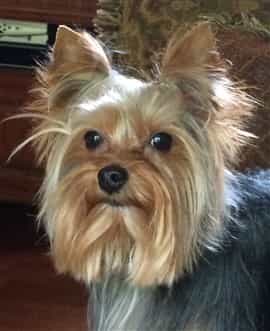
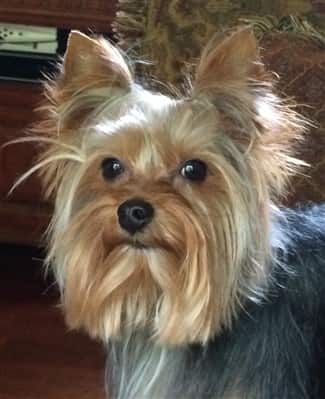
Atticus Finch, photo courtesy of Lisa Schwarte
To Summarize
If your Yorkie likes to eat grass, this is a habit that should be dealt with since it can cause a number of serious problems and may be indicative of a nutritional deficiency.
You’ll want to start by having the veterinarian rule out possible health issues. Then, the steps to fixing this are to reassess your Yorkie’s diet, supervise, offer ways to keep your dog busy while out in the yard, keep walks purposeful, and know how to react to grass-eating attempts.
Do you have your book yet?
If you're looking for an incredibly comprehensive Yorkie book, you'll love Y.I.C's GIANT Book of Yorkshire Terrier Care.
You May Also Like:
Being Allergic to a Yorkshire Terrier- While many claim that dogs with hair are hypoallergenic, this is not true. Proteins in dander, saliva and urine can cause allergic reactions in up to 10% of pet owners.
Yorkshire Terrier Safety
- Read the top 10 things you can do to keep your Yorkie puppy or adult dog safe at all times.
Yorkie Bad Breath Issues
- Learn why this is so common and steps you can take to resolve this.
How to Fix Dry Skin on a Yorkie
- There are several factors that can cause this breed's sensitive skin to dry out and it's best to resolve this before it spirals into bigger problems.
Keeping a Yorkie Safe Outside
- An article that answers all of your outdoor-related questions.
Fun Safe Ways to Carry a Yorkie
- From backpack-type bags to totes and slings, see some great ways to take your Yorkie with you to all sorts of places.
All content is protected by US and International copyright laws. All rights reserved.
We are a participant in the Amazon Services LLC Associates Program, an affiliate advertising program designed to provide a means for us to earn fees by linking to Amazon.com and affiliated sites. As an Amazon Associate, we earn from qualifying purchases.

